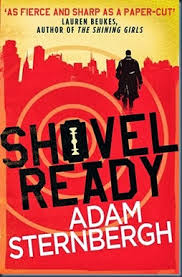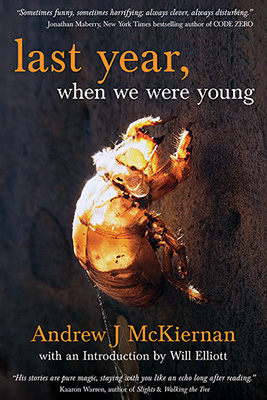
Alayna Cole
Alayna Cole loves to write stories when she’s not studying for her Bachelor of Education/Bachelor of Arts.
 Shovel Ready – a thrilling novel by Adam Sternbergh – follows the story of a garbageman turned hitman who agrees to a new job and is met with an unexpected series of ethical dilemmas and more responsibilities than he bargained for.
Shovel Ready – a thrilling novel by Adam Sternbergh – follows the story of a garbageman turned hitman who agrees to a new job and is met with an unexpected series of ethical dilemmas and more responsibilities than he bargained for.
The novel is set in dystopian New York after it was ravaged by a short series of events that ultimately led to its demise. The setting is artfully constructed, littered with symbolic subtleties and just enough realism for it to be frightening. Compared to the extreme weather events and natural disasters that are often to blame for comparable settings, the causes of this dystopia are strangely anti-climactic, but this is by no means a criticism. What happens to Times Square, and subsequently the rest of New York, is alarmingly plausible and the knowledge that humans are entirely capable of initiating a similar domino effect is enthralling.
While exploring these ideas of man-made dystopia through action sequences, Sternbergh also examines how dystopia can be forged by inaction. ‘Tapping in’ – the act of escaping to a dream world through the use of a ‘bed’ and the aid of modern technology – provides a perfect constructed life for any residents of New York who can afford the privilege. The addiction to technology that this propagates is depicted as inherently problematic and acts as a clever comment on the increasing reliance on other facets of technology, such as the internet and smart phones. This social commentary is reminiscent of how the popularisation of visual media, such as television, was criticised in Ray Bradbury’s Fahrenheit 451.
The protagonist and anti-hero of Shovel Ready – who is known only as Spademan – is remarkably multi-faceted. Sternbergh does an incredible job of constructing a character who is both likeable and unlikeable, and to whom readers can relate. Spademan may be a hitman, but he is not simply a weapon lacking dimension; as much as he enjoys claiming to be only a disinterested, amoral bullet, he is still characterised by a layered backstory that has notable impacts on his personality traits. Clever foreshadowing ensures that, as Spademan’s story is revealed, memories and flashbacks are simultaneously surprising and believable.
Sentences are sharp and punctuation is used sparingly, with quotation marks neglected altogether. The lack of attribution in scenes featuring heavy dialogue leads to occasional confusion as to who is speaking, but this deliberate stylistic choice is effective in making the prose appear as sparse as the setting. The minimalist writing style is symbolic of the luxuries the novel’s characters are unable to afford and resembles the narration of Cormac McCarthy’s The Road, in which comparable stylistic choices achieve a similar effect.
The narrator’s unique voice is witty and punchy and gives even more life to Spademan’s fascinating character. This narrator evokes a range of emotions – from hilarity to melancholy, from rage to curiosity – with each turn of the page. This novel is engaging and the ideas continue to be captivating days after it ends.
 The short story collection Last Year, When We Were Young, by Andrew J McKiernan, shines a unique light on classic horror. The sixteen tales in the collection draw inspiration from a variety of genres and styles, with the magically humorous juxtaposed against the frightfully repulsive, but each story has something in common: they are all hauntingly clever.
The short story collection Last Year, When We Were Young, by Andrew J McKiernan, shines a unique light on classic horror. The sixteen tales in the collection draw inspiration from a variety of genres and styles, with the magically humorous juxtaposed against the frightfully repulsive, but each story has something in common: they are all hauntingly clever.



















 Shovel Ready – a thrilling novel by Adam Sternbergh – follows the story of a garbageman turned hitman who agrees to a new job and is met with an unexpected series of ethical dilemmas and more responsibilities than he bargained for.
Shovel Ready – a thrilling novel by Adam Sternbergh – follows the story of a garbageman turned hitman who agrees to a new job and is met with an unexpected series of ethical dilemmas and more responsibilities than he bargained for.














